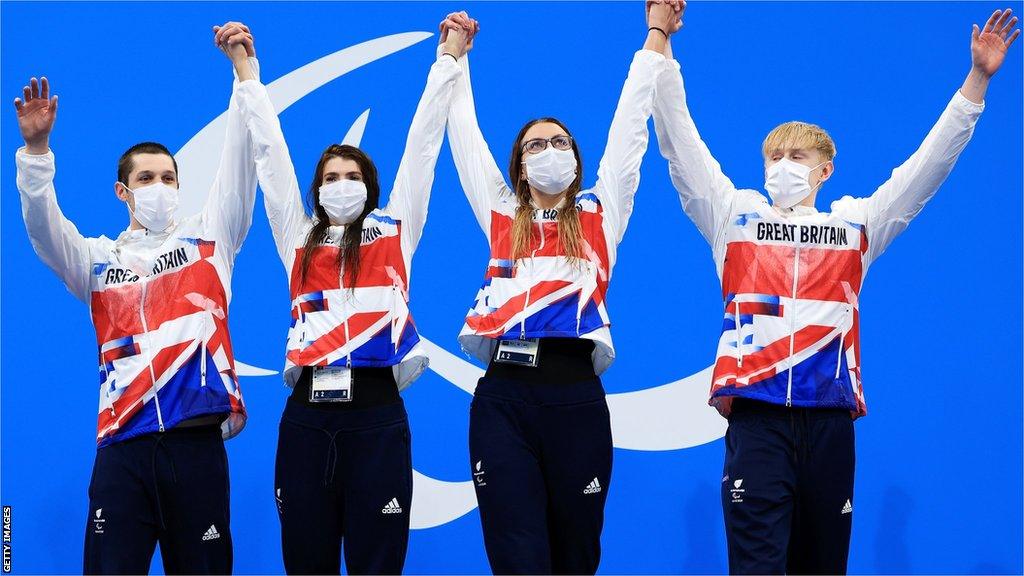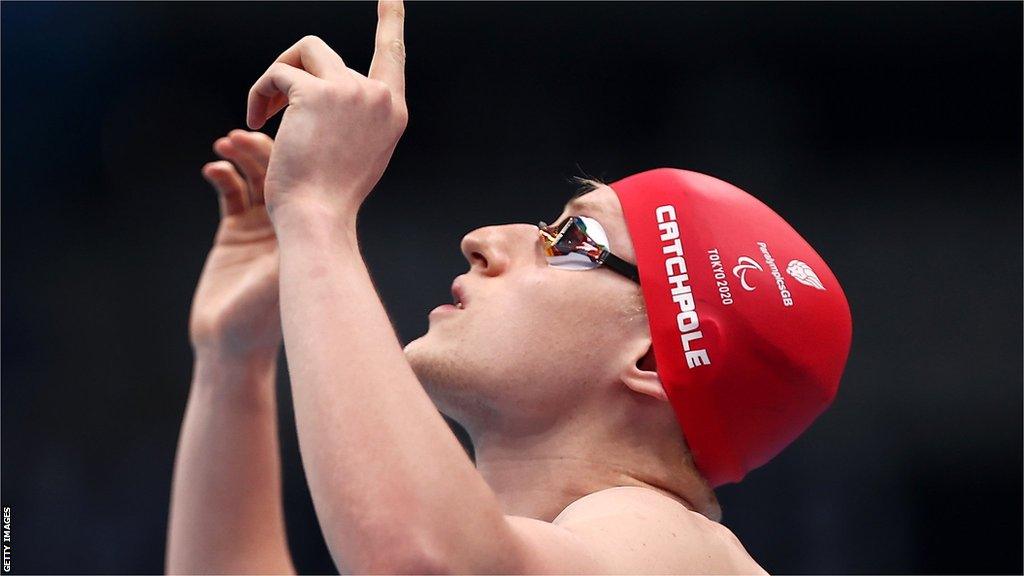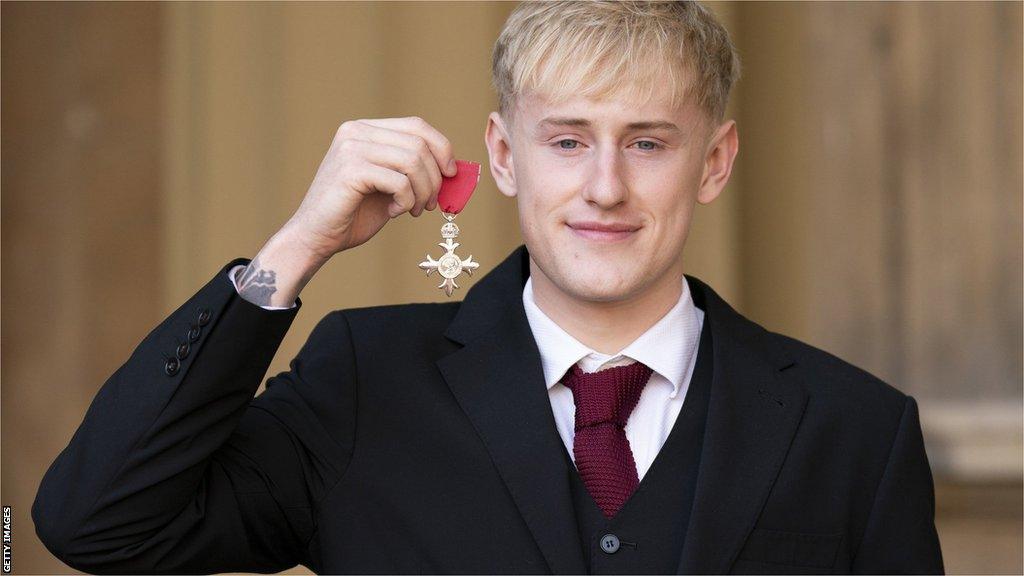Jordan Catchpole: Paralympic gold medallist on challenges of being an autistic athlete
- Published

Jordan Catchpole (right) alongside fellow Tokyo 2020 S14 mixed 4x100m freestyle relay gold medallists Reece Dunn, Bethany Firth and Jessica-Jane Applegate
Routine and repetition is important for most sporting successes, but when you're autistic it's often even more critical. As part of Neurodiversity Celebration Week, and before this week's Para-swimming World Championships trials in Sheffield, GB Para-swimmer and Tokyo Paralympic gold medallist Jordan Catchpole opens up about life as an autistic athlete.
Being diagnosed as autistic aged 15 was a game-changing moment for me. I really struggled at school and kept getting in trouble. Teachers had no idea how to deal with me.
Everyone thought I was just naughty. I hated it. A breakdown led to me getting diagnosed and it was the best possible thing for me - it has allowed me to understand my strengths and weaknesses.
I don't know where I'd be without swimming. Without it there is a real emptiness and lack of routine.
For me, the pool is a very calming place. I'm in my own world. Everything outside the pool just becomes a complete blur and gets pushed to the back of my mind.
Every time I finish a session, I'm in a better mood than when I went in.
'Some coaches haven't given me the support I need'
I've been with my current coach, Tim Millett, for nearly four years now and we have a great working relationship. He helps make my life as easy as possible. Since finding a coach that knows how to deal with me and understands me, my performance has gone up massively.
I've had a number of coaches over the years and some have understood me better than others. But some haven't given me the support I need, focusing on other athletes or sometimes not even turning up.
One of them went on holiday before a big competition. It was overwhelming and totally threw off my routine. I didn't perform as well as I could have and it makes sense why I didn't hit my targets that year.
You might know somebody who is autistic but none of us are the same. We're all individuals.
Performance and understanding is massively linked. I think you need a coach, no matter what sport you're in, to understand you and the way you think. To be successful, it is really important to know the person as well as the talent.
'The biggest obstacles are things that are out of my control'

Jordan Catchpole's main event is 100m backstroke
An end goal is hugely important to me because it gives me something to work towards. Training, and just general life, is 10 times harder without structure and a finishing line. I work best with a plan and a schedule.
When I'm away, I just try to find routine as best I can because it keeps me focused. The biggest obstacles are things that are out of my control. For example, when a meet doesn't happen or a flight is cancelled. It really throws me off.
Back in 2017 I was selected for my first World Championships in Mexico but it was postponed after the country was struck by a powerful earthquake that sadly killed more than 200 people. Great Britain pulled out of the rearranged event, partly because of safety concerns.
It hit me hard. It took me a long time to accept and process the fact that we weren't going. I just ended up taking a week off swimming to try to reset. I knew I just had to take my mind off it completely.
I get very frustrated, sometimes even angry, when there are delays on the train or I'm stuck in traffic.
I don't deal well with surprises and it's tiring to adjust mentally to a new plan. There's not much you can do other than take time out or push that stress to the back of your mind.
Food is also really hard when I go away. Obviously different countries have their own cuisine, and when we went to Japan for the Tokyo Paralympics it was mainly sushi and fish. I'm not a fan of that so it was quite a headache and another change to react to.
These days, when we're travelling or competing, my coaches and team-mates try and give me as much warning as possible of any changes. They try and tell me as much as they can about swim camps and travel days so that I can plan well in advance.
I think it's very helpful to have other swimmers around who are also autistic or have learning difficulties. We all understand what annoys us and stresses us out so it's good to be able to help each other.
My team-mate Reece Dunn, who is also autistic, is a real source of inspiration to me. We're very good friends and he's achieved quite a lot so I look up to him in many ways.
We push each other to be our best and we've had some very close races before. It's also just really helpful to have someone like him on the team. He understands me and I understand him.
During the worst of the Covid-19 pandemic, I didn't swim for six months. When the Paralympics were postponed, I lost all motivation and became depressed - but once we knew they were going ahead in 2021, I managed to get back on track and it was a dream to win a gold medal in the S14 mixed 4x100m freestyle relay.
'I'll see where I'm at for the Paris Paralympics'

Catchpole received his MBE from the Princess Royal at Buckingham Palace in October
After the Tokyo Paralympics, I was awarded an MBE and this isn't something you'd expect from swimming up and down in a pool. It felt like a dream. I went to Buckingham Palace and had to get suited and booted.
I'm used to wearing tracksuits and being nice and comfy, so to wear a suit and be surrounded by the royal family and very high up people, it was definitely a change.
This year's World Championships are on the horizon and this week's event in Sheffield acts as the trials to qualify.
The fact the Worlds are in Manchester helps me massively. We're used to that area and used to the swimming pool, so that helps the routine and the stress of travelling is also reduced. I'm looking forward to it.
I'm swimming well at the minute. I broke a British freestyle and backstroke short-course record late last year so I'm on the right track.
I'm definitely aiming for a gold. That's obviously everyone's target. I just need to get quicker and see where I'm at for the Paris Paralympics next year.
Of course, winning more golds is my number one ambition but I also just want to try and inspire as many people as I can along the way, whether they're autistic or not.
The sporting world is slowly getting better at supporting autistic athletes. I still don't think that it's quite up to scratch yet, but it's definitely headed in the right direction.
It's so important to raise awareness about life being autistic.
Every autistic person is different but a lot of us don't have a voice or a platform. The more athletes that talk about it publicly, the better.
We just need understanding.
As told to Nick Ransom.

Elon Musk's Twitter Storm: Find out how the new owner is transforming the company
Are eco laundry products better for the environment?: Greg Foot investigates how such claims come out in the wash...
